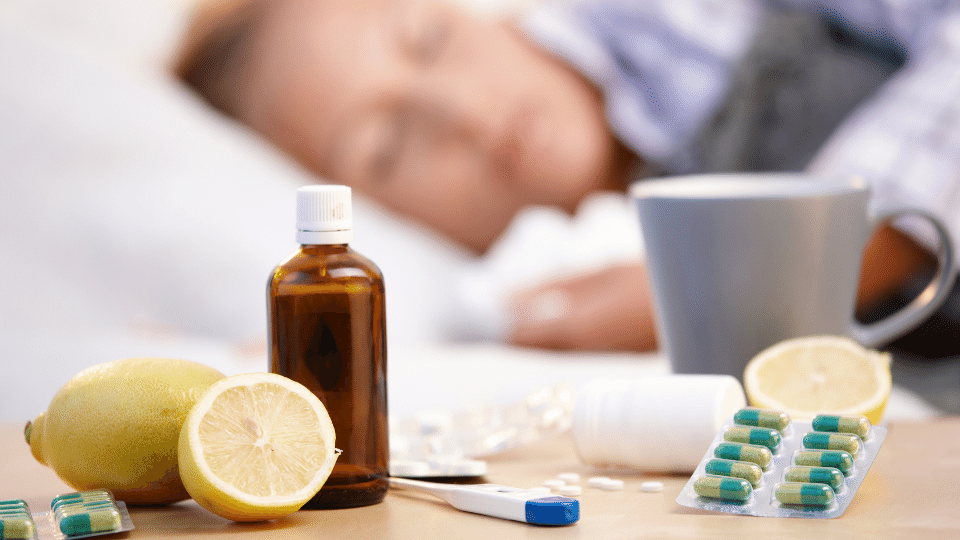It's the season of flu again, yet here we are with the scare of COVID 19 as well. After the celebration of New Year, we can’t deny the fact that a lot of people went sick during those times. It brought panic to everyone, scared as if they are infected by COVID 19 too.
The time when the influenza virus is most transmitted is commonly referred to as the "flu season." This period usually occurs during the colder months of the year. Although there are home remedies to cure colds, it is better for everyone to differentiate and get a proper cure for the sickness. December to February is the coldest season in the Philippines. It is also important to consult a doctor or specialist to help you get better.
Difference between COVID and Flu
Before we suspect that we are infected, here are the things to know about COVID and flu symptoms. How does COVID 19 differ from Flu?
COVID-19 and the flu both cause respiratory infection and the signs may be very similar. However, there also are key variations to these two.
Symptoms
The most common symptoms of COVID 19 are:
- Fever
- Cough
- Fatigue
- Shortness of breath
Additional symptoms that may occur and people experience are:
- muscle aches and pains
- headache
- runny or stuffy nose
- sore throat
- nausea or diarrhea
- chills
- frequent shaking with chills
- loss of smell
- loss of taste
Meanwhile, people with Flu might experience the following:
- fever
- chills
- cough
- fatigue
- body aches and pains
- headache
- runny or stuffy nose
- sore throat
- nausea or diarrhea
Incubation Period
The incubation period is the time from the initial infection to the onset of symptoms.
COVID 19 - The incubation period is 2-14 days. According to the Centers for Disease Control and Prevention (CDC), the average incubation period is estimated to be 4 to 5 days.
Flu - The incubation period for flu is shorter, averaging about 2 days and 1 to 4 days.
Vaccines
Vaccines are available against seasonal flu. It is updated annually to target the strains of the flu virus thought to be most common during flu season. The seasonal flu shot is the most effective way to avoid getting the flu. Although you can still get the flu after getting vaccinated, your illness may be milder. There are also antiviral medicines for the flu. If given early, they can help ease symptoms and shorten the duration of illness.
Currently, several COVID 19 vaccines are still in clinical trials. The FDA reviews the results of these trials before approving or licensing a COVID19 vaccine. But because of the urgent need for a COVID 19 vaccine, the usual FDA's vaccine approval process that can take months or even years can be shorter. The FDA can grant an emergency use authorization for a COVID 19 vaccine for the first time in a short duration. Although the data must show that the vaccine is safe and effective before the FDA can authorize or approve it for emergency use. Some of these vaccines include Pfizer, Moderna, and Janssen.
What should you do if you are infected with Flu or COVID 19?
Most people with the flu have a mild illness and do not need medical care or antivirals. In most cases, if you have symptoms of the flu, you should stay at home or in a condominium if you are currently in a condo living. Make sure to avoid contact with others except to see a doctor.
Flu can dehydrate you, especially if you are vomiting or having diarrhea. So make sure you have enough liquid. Water is okay, as well as fruit juices and electrolyte drinks. Caffeine is a diuretic, so keep away from caffeinated beverages.
Try to stay away from others as much as possible to prevent infecting them. If you need to leave the house for medical purposes, wear a face mask and cover your mouth when coughing or try to sneeze with a tissue. Wash your hands frequently to prevent the flu from spreading to others.
Steps to consider if you get infected with COVID 19?
Get Tested
If you have symptoms of COVID 19, get tested. Keep your distance from others, including staying away from the people who live in your family while waiting for the test results. Self-testing is one of several options for testing the virus that causes COVID19 and is more convenient than lab-based testing or point-of-care testing. Contact your doctor or local health department if you need assistance interpreting the test results.
Stay at Home
People with COVID 19 have a mild illness and can recover at home without medical care. Do not leave the house except for medical treatment. Do not visit public areas. Be careful. Take a rest and always drink water. Take over-the-counter medications such as acetaminophen to improve your health. Stay in touch with your physician and call before seeing a doctor. Always seek medical attention if you have difficulty breathing or other signs of an emergency alert.
Stay in a specific space and stay as far away as possible from other people and pets in your home. If possible, use a different bathroom. Wear a mask if you need to be with other people or animals inside or outside the house. Tell your close contacts that you may have been infected with COVID 19. An infected person may spread COVID 19 from 48 hours (or 2 days) before the person shows any symptoms or tests positive. You can keep everyone safe by letting your close contacts know that you may have been infected with COVID 19.
When to seek emergency attention?
If anyone shows any of these signs, seek emergency medical attention immediately:
- Hard time breathing
- Persistent chest pain or pressure
- Can't stay awake
- Light, gray, or bluish skin
How can you prevent the spread of the virus?
Wash your hands frequently with water and soap for at least 20 seconds. This is very important after blowing your nose, sneezing, or coughing. If soap and water are not available, use a hand sanitizer. Cover all surfaces of your hands with an alcohol-based hand sanitizer containing at least 60% alcohol and rub together until dry to the touch.
Always disinfect the surfaces that are frequently touched in the sick room and bathrooms. Please wear disposable gloves. Have someone else clean and disinfect the surface of the common area, but you should clean the bedroom and bathroom if possible. You should also try to rearrange your home or condo design for proper ventilation inside.
Getting sick frequently inside your home might be a sign of considering a new one. You may consider checking a ready-for-occupancy condo that has a healthy and safe community. A condo in Manila like Vista Heights is good as it is equipped with excellent amenities making sure that everyone is safe. Meanwhile, if you want to live outside the city, you might want to get a condo in Baguio. Down south, a condo in Cebu is not so bad to be considered on your list as it provides history, security, and modernity in one place.
In these trying times, don’t forget to follow all the safety protocols and do everything to stay healthy at all costs.
Vista Residences is the condominium arm of the country’s largest homebuilder, Vista Land & Lifescapes, Inc. that offers ready for occupancy and pre-selling condominium projects in Manila, Makati, Mandaluyong, Quezon City, Ortigas, Baguio, Cebu, and CDO that are strategically located within major cities, in close proximity to premium universities, transit-oriented locations, and developed business districts.
For more information on Vista Residences, email [email protected], follow @VistaResidencesOfficial on Facebook, Twitter, Instagram, and YouTube, or call the Marketing Office at 0999 886 4262 / 0917 582 5167.










